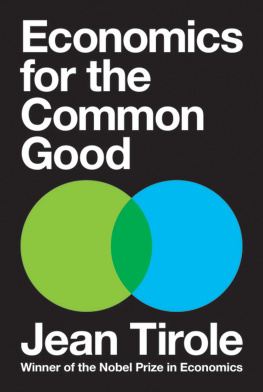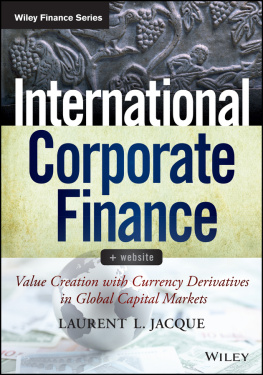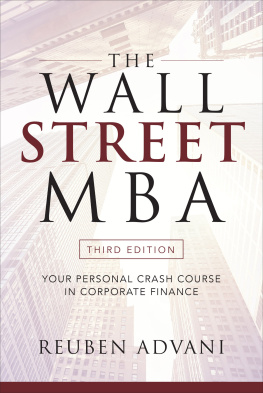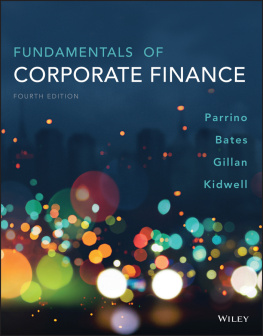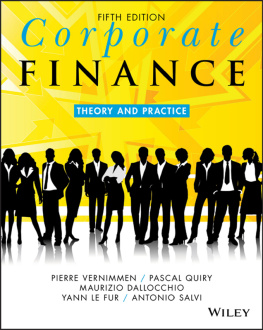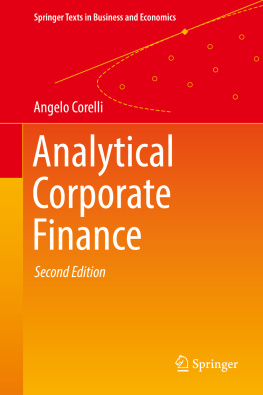Jean Tirole - The Theory of Corporate Finance
Here you can read online Jean Tirole - The Theory of Corporate Finance full text of the book (entire story) in english for free. Download pdf and epub, get meaning, cover and reviews about this ebook. year: 2009, publisher: Princeton University Press, genre: Home and family. Description of the work, (preface) as well as reviews are available. Best literature library LitArk.com created for fans of good reading and offers a wide selection of genres:
Romance novel
Science fiction
Adventure
Detective
Science
History
Home and family
Prose
Art
Politics
Computer
Non-fiction
Religion
Business
Children
Humor
Choose a favorite category and find really read worthwhile books. Enjoy immersion in the world of imagination, feel the emotions of the characters or learn something new for yourself, make an fascinating discovery.

- Book:The Theory of Corporate Finance
- Author:
- Publisher:Princeton University Press
- Genre:
- Year:2009
- Rating:5 / 5
- Favourites:Add to favourites
- Your mark:
- 100
- 1
- 2
- 3
- 4
- 5
The Theory of Corporate Finance : summary, description and annotation
We offer to read an annotation, description, summary or preface (depends on what the author of the book "The Theory of Corporate Finance " wrote himself). If you haven't found the necessary information about the book — write in the comments, we will try to find it.
The Theory of Corporate Finance — read online for free the complete book (whole text) full work
Below is the text of the book, divided by pages. System saving the place of the last page read, allows you to conveniently read the book "The Theory of Corporate Finance " online for free, without having to search again every time where you left off. Put a bookmark, and you can go to the page where you finished reading at any time.
Font size:
Interval:
Bookmark:
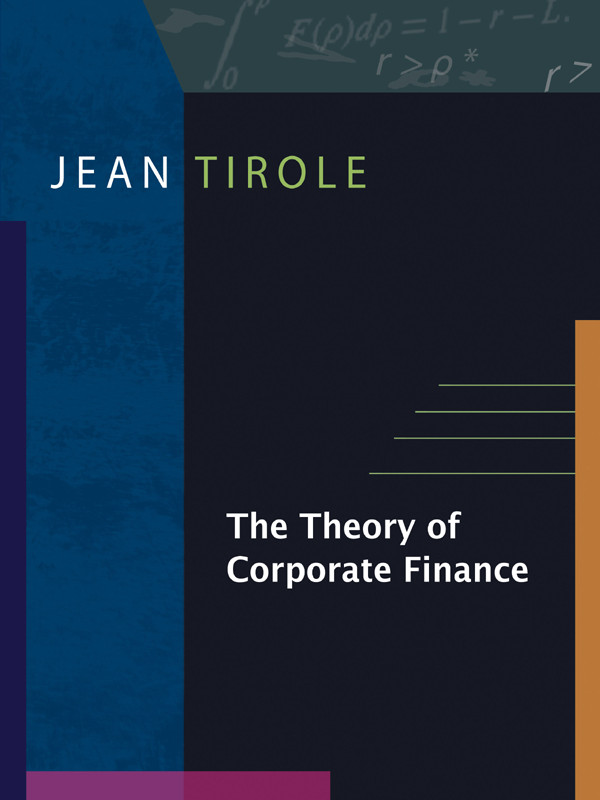
The Theory of Corporate Finance
Jean Tirole
Princeton University Press
Princeton and Oxford
Copyright 2006 by Princeton University Press
Published by Princeton University Press,
41 William Street, Princeton, New Jersey 08540
In the United Kingdom: Princeton University Press,
3 Market Place, Woodstock, Oxfordshire OX20 1SY
All rights reserved
Library of Congress Cataloguing-in-Publication Data
Tirole, Jean.
The theory of corporate finance / Jean Tirole.
p. cm.
Includes bibliographical references and index.
ISBN-13: 978-0-691-12556-2 (cloth: alk. paper)
ISBN-10: 0-691-12556-2 (cloth: alk. paper)
1. CorporationsFinance. 2. Business enterprisesFinance.
3. Corporate governance. I. Title.
HG4011.T57 2006
338.43001dc22 2005052166
British Library Cataloguing-in-Publication Data
A catalogue record for this book is available from the British Library
This book has been composed in LucidaBright and
typeset by T&T Productions Ltd, London
Printed on acid-free paper 
www.pup.princeton.edu
Printed in the United States of America
1 2 3 4 5 6 7 8 9 10
Nas, Margot, et Romain
While bearing my name as sole author, this book is largely a collective undertaking and would not exist without the talent and generosity of a large number of people.
First of all, this book owes much to my collaboration with Bengt Holmstrm. Many chapters indeed borrow unrestrainedly from joint work and discussions with him.
This book benefited substantially from the input of researchers and students who helped fashion its form and its content. I am grateful to Philippe Aghion, Arnoud Boot, Philip Bond, Giacinta Cestone, Gilles Chemla, Jing-Yuang Chiou, Roberta Dessi, Mathias Dewatripont, Emmanuel Farhi, Antoine Faure-Grimaud, Daniel Gottlieb, Denis Gromb, Bruno Jullien, Dominique Oli Lauga, Josh Lerner, Marco Pagano, Parag Pathak, Alessandro Pavan, Marek Pycia, Patrick Rey, Jean-Charles Rochet, Bernard Salani, Yossi Spiegel, Anton Souvorov, David Sraer, Jeremy Stein, Olga Shurchkov, David Thesmar, Flavio Toxvaerd, Harald Uhlig, Michael Weisbach, Lucy White, and several anonymous reviewers for very helpful comments.
Jing-Yuang Chiou, Emmanuel Farhi, Denis Gromb, Antoine Faure-Grimaud, Josh Lerner, and Marco Pagano in particular were extremely generous with their time and gave extremely detailed comments on the penultimate draft. They deserve very special thanks. Catherine Bobtcheff and Aggey Semenov provided excellent research assistance on the last draft.
Drafts of this book were taught at the Ecole Polytechnique, the University of Toulouse, the Massachusetts Institute of Technology (MIT), Gerzensee, the University of Lausanne, and Wuhan University; I am grateful to the students in these institutions for their comments and suggestions.
I am, of course, entirely responsible for any remaining errors and omissions. Needless to say, I will be grateful to have these pointed out; comments on this book can be either communicated to me directly or uploaded on the following website:
http://www.pupress.princeton.edu/tltles/8123.html
Note that this website also contains exercises, answers, and some lecture transparencies which are available for lecturers to download and adapt for their own use, with appropriate acknowledgement.
Pierrette Vaissade, my assistant, deserves very special thanks for her high standards and remarkable skills. Her patience with the many revisions during the decade over which this book was elaborated was matched only by her ever cheerful mood. She just did a wonderful job. I am also grateful to Emily Gallagher for always making my visits to MIT run smoothly.
At Princeton University Press, Richard Baggaley, my editor, and Peter Dougherty, its director, provided very useful advice and encouragement at various stages of the production. Jon Wainwright, with the help of Sam Clark, at T&T Productions Ltd did a truly superb job at editing the manuscript and typesetting the book, and always kept good spirits despite long hours, a tight schedule, and my incessant changes and requests.
I also benefited from very special research environments and colleagues: foremost, the Institut dEconomie Industrielle (IDEI), founded within the University of Toulouse 1 by Jean-Jacques Laffont, for its congenial and stimulating environment; and also the economics department at MIT and the Ecole Nationale des Ponts et Chausses (CERAS, now part of Paris Sciences Economiques). The friendly encouragement of my colleagues in those institutions was invaluable.
My wife, Nathalie, and our children, Nais, Margot, and Romain, provided much understanding, support, and love during the long period that was needed to bring this book to fruition.
Finally, may this book be a (modest) tribute to Jean-Jacques Laffont. Jean-Jacques prematurely passed away on May 1, 2004. I will always cherish the memory of our innumerable discussions, over the twenty-three years of our collaboration, on the topics of this book, economics more generally, his many projects and dreams, and life. He was, for me as for many others, a role model, a mentor, and a dear friend.
This introduction has a dual purpose: it explains the books approach and the organization of the chapters; and it points up some important topics that receive insufficient attention in the book (and provides an inexhaustive list of references for additional reading). This introduction will be of most use to teachers and graduate students. Anyone without a strong economics background who is finding it tough going on a first reading should turn straight to Chapter 1.
The field of corporate finance has undergone a tremendous mutation in the past twenty years. A substantial and important body of empirical work has provided a clearer picture of patterns of corporate financing and governance, and of their impact for firm behavior and macroeconomic activity. On the theoretical front, the 1970s came to the view that the dominant Arrow-Debreu general equilibrium model of frictionless markets (presumed perfectly competitive and complete, and unhampered by taxes, transaction costs, and informational asymmetries) could prove to be a powerful tool for analyzing the pricing of claims in financial markets, but said little about the firms financial choices and about their governance. To the extent that financial claims returns depend on some choices such as investments, these choices, in the complete market paradigm of Arrow and Debreu, are assumed to be contractible and therefore are not affected by moral hazard. Furthermore, investors agree on the distribution of a claims returns; that is, financial markets are not plagued by problems of asymmetric information. Viewed through the Arrow-Debreu lens, the key issue for financial economists is the allocation of risk among investors and the pricing of redundant claims by arbitrage.
Relatedly, Modigliani and Miller in two papers in 1958 and 1963 proved the rather remarkable result that under some conditions a firms financial structure, for example, its choice of leverage or of dividend policy, is irrelevant. The simplest set of such conditions is the Arrow-Debreu environment (complete markets, no transaction costs, no taxes, no bankruptcy costs). The value of a financial claim is then equal to the value of the random return of this claim computed at the Arrow-Debreu prices (that is, the prices of state-contingent securities, where a state-contingent security is a security delivering one unit of numraire in a given state of nature). The total value of a firm, equal to the sum of the values of the claims it issues, is thus equal to the value of the random return of the firm computed at the Arrow-Debreu prices. In other words, the size of the pie is unaffected by the way it is carved.
Font size:
Interval:
Bookmark:
Similar books «The Theory of Corporate Finance »
Look at similar books to The Theory of Corporate Finance . We have selected literature similar in name and meaning in the hope of providing readers with more options to find new, interesting, not yet read works.
Discussion, reviews of the book The Theory of Corporate Finance and just readers' own opinions. Leave your comments, write what you think about the work, its meaning or the main characters. Specify what exactly you liked and what you didn't like, and why you think so.

